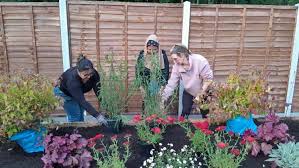In Dawberry, Wasteland Transforms to Garden

By Abbas Nazil
A neglected strip of land on Dawberry Road in Kings Heath, Birmingham, plagued by fly-tipping and antisocial behaviour for nearly 20 years, has been transformed into a vibrant community garden, fostering friendships, boosting mental health, and reigniting a sense of purpose among local residents.
This inspiring project, spearheaded by resident action group, Our Scene CIC, has turned the corner of Dawberry Road into a thriving hub for nature and community engagement.
The initiative began with residents rallying together to address the loss of community centres and youth clubs in the area, seeking a way to rebuild connections through their shared love of nature.
In March, Our Scene CIC secured permission from Birmingham City Council to reclaim the overgrown space, aided by a grant from the Nature Hubs fund.
The fund, established by environmental charity Hubbub in collaboration with Starbucks, provided crucial financial support for clearing the land and launching the project.
Suzanne Carter, the chief executive of Our Scene CIC, emphasized the transformative power of the garden.
“This project has been a game-changer for reuniting people,” Carter said, adding, “We have brought back a community space and are turning it into a community asset where we can come together, celebrate each other’s cultural traditions, and foster a sense of belonging.”
She added, “In a community, having somewhere to go where you can be useful, have a purpose, and meet like-minded people has been really good.”
The centrepiece of the Dawberry Community Garden, designed by gardener Deborah Mole, gained significant recognition when it was featured at the BBC Gardeners’ World show at the NEC in Birmingham during the summer.
Mole’s decorative garden design embodies the spirit of inclusivity and connection, reflecting the broader goals of the project.
“These days, in an urban world, it is quite hard to get a connection to nature and outdoor spaces,” Mole explained, adding, “This garden is not just about aesthetics; it’s about community spirit. It is altruistic and offers something for everybody. Anyone can get involved and bring their skills to the table.”
For residents, the impact of the garden on their mental and social well-being has been profound. Research collected by Hubbub highlights a concerning trend: more than a third of people in the UK spend less than an hour a week in nature.
The Dawberry Community Garden has provided a crucial counterbalance for the local community, offering a space to reconnect with nature and each other.
Local resident Jayne Faulkner shared how the project had changed her life. “I used to tend my own back garden, but when I got ill, I couldn’t do it anymore,” she said.
“When this project came up, I no longer had to do things by myself. I could garden alongside others, and it has been so inspiring,” Faulkner said delightedly.
Faulkner described how the garden helped her overcome isolation and improve her mental health, disclosing, “When I first got ill, I didn’t want to leave the house, but now friends I’ve made here often visit me. It has done so much for my mental health; I can’t emphasize it enough. The area needed something like this.”
Beyond individual benefits, the garden has strengthened community ties and encouraged collaboration.
Residents of all ages and backgrounds have come together to share their skills, stories, and cultures, creating a vibrant and inclusive space.
The project’s success is a testament to the power of grassroots efforts and the enduring value of green spaces in urban areas.
As plans for the garden continue to unfold, Our Scene CIC aims to involve more members of the community, expanding the garden’s role as a center for cultural exchange, environmental education, and social bonding.
Carter expressed her optimism for the garden’s future, envisioning it as a cornerstone of community life where residents can gather, celebrate, and support one another.
The Dawberry Community Garden serves as a shining example of how a neglected space can be transformed into a source of pride, joy, and connection for an entire neighborhood.
In an era where urban isolation is a growing concern, projects like this demonstrate the immense potential of community-driven initiatives to restore not only physical spaces but also the human spirit. END
Source: BBC
